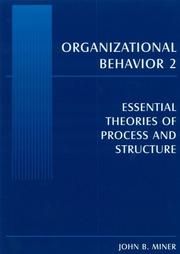| Listing 1 - 2 of 2 |
Sort by
|

ISBN: 0765615258 9780765615268 0765615266 076561524X 0765615231 1315702010 9786610912520 1280912529 0765621835 9780765615244 9780765615282 9780765615305 9780765615299 0765615274 0765615282 9780765619907 9780765619914 9780765619907 9780765619921 9781315701974 9781317463443 9781317463450 9781315701998 9781317463504 9781317463511 9780765615275 9781315701981 9781317463474 9781317463481 9781315702018 9781317463566 9781317463573 9780765615237 9781315702001 9781317463535 9781317463542 9780765615251 1317463587 1317463579 9780765621832 9780765621849 0765621843 9781317463580 0765624338 9780765624338 9781280912528 6610912521 Year: 2005 Publisher: Abingdon, Oxon ; New York, NY : Routledge,
Abstract | Keywords | Export | Availability | Bookmark
 Loading...
Loading...Choose an application
- Reference Manager
- EndNote
- RefWorks (Direct export to RefWorks)
Volume 5 This volume makes available in one place the large body of research that has been developed over the years on role motivation theory. Author Jack Miner has always been concerned with unconscious factors in human experience, and this work is designed to give proper emphasis to their role in organizational behavior. Part I reviews the current status of projective techniques and the recent work that has been done on unconscious motivation. Part II covers Miner's significant research in the field, from his early work at the Atlantic Refining Company to his career-long leadership studies of Princeton University graduates. The chapters in Part III involve psychometric data analysis, meta-analysis, and factor analysis.
AA / International- internationaal --- 650 --- Theorieën en grondbeginselen. Management. --- Führungstheorie. --- Motivationstheorie. --- Organisatiegedrag. --- Organizational behavior --- Behavior in organizations --- Management --- Organization --- Psychology, Industrial --- Social psychology --- Theorieën en grondbeginselen. Management --- #SBIB:35H300 --- #SBIB:316.334.2A500 --- Organisatieleer: algemene werken --- Organisatiesociologie: algemeen --- Employee motivation --- Leadership --- Ability --- Command of troops --- Followership --- Motivation in industry --- Work motivation --- Motivation (Psychology) --- Personnel management --- Goal setting in personnel management --- Comportement organisationnel --- Sociologie des organisations --- Prise de décision --- Motivation (psychologie) --- Personnel --- Organizational sociology --- Decision making --- Aspect psychologique --- Motivation --- Psychological aspects --- Comportement organisationnel. --- Employee motivation. --- Leadership. --- Leiderschap. --- Motivatie. --- Organisationsverhalten. --- Organizational behavior. --- Theorie. --- Motivation. --- Sociologie des organisations. --- Prise de décision. --- Aspect psychologique. --- Prise de décision.
Book
ISBN: 9783515124041 3515124047 9783515124072 3515124071 Year: 2020 Publisher: Stuttgart Franz Steiner Verlag
Abstract | Keywords | Export | Availability | Bookmark
 Loading...
Loading...Choose an application
- Reference Manager
- EndNote
- RefWorks (Direct export to RefWorks)
This e-book focuses on the functioning of Roman leadership in the period of the Tetrarchs to Theodosius (284–395). Our volume starts from the idea that the imperial and ecclesiastical administrations became interdependent in this period and thus presents an integrated approach of imperial and religious leadership. As the spread of ideology plays a key role in creating societal consensus and thus in wielding power successfully, the volume analyses both types of leadership from an ideological angle. It examines the communicative strategies employed by Roman emperors and bishops through analyzing the ideological messages that were disseminated by a variety of media: coins, architectural monuments, literary and legal texts. The central question of this volume is how, in a period in which an important shift took place in the power balance between church and state, emperors and bishops made use of ideology to bind people to them and thus to interact with their ‘crowds’, whether they be the inhabitants of the city of Rome or Constantinople, the subjects of the Empire at large or the members of the various religious communities.
Ideology --- Leadership --- Leadership. --- 284-476. --- Rome (Empire). --- Rome --- History --- E-books --- Repräsentation --- Macht --- Führung --- Geschichte 284-395 --- Römisches Reich --- (Produktform)Electronic book text --- Roman Empire --- Roman History --- Roman bishops --- Roman crowds --- Roman emperors --- Roman ideology --- Roman imperial leadership --- Theodosius --- ecclesiastical administration --- imperial administration --- tetrarchy --- (VLB-WN)9553 --- Führen --- Führerschaft --- Personalführung --- Mitarbeiterführung --- Menschenführung --- Führungsverhalten --- Führungslehre --- Führungstheorie --- Management --- Politische Macht --- Soziale Macht --- Sozialer Einfluss --- Autorität --- Einfluss --- Gewalt --- Herrschaft --- Machtlosigkeit --- Imperium Romanum --- Reich Rom --- Italien --- Antike --- Römerzeit --- Römer --- v753-500 --- Geschichte 753 v. Chr.-500 --- Idéologie --- Ideology. --- Congresses. --- 284-476
| Listing 1 - 2 of 2 |
Sort by
|

 Search
Search Feedback
Feedback About UniCat
About UniCat  Help
Help News
News